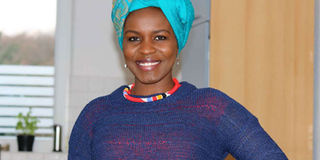TAKE 5 with Wanjiku Mwaura

Wanjiku Mwaura. PHOTO | COURTESY
What you need to know:
- I started performing when I was very young, around five and began writing when I was in high school.
- In Germany, there are funds from the government for cultural activities, including for performance poetry. In Kenya, that is not the case.
- I miss being able to walk to Lucy’s, my hair stylist, and just having someone do my hair.
Wanjiku Mwaura is a poet, panel moderator, and journalist with Deutsche Welle, Germany’s international broadcaster.
She enjoys creating new works in different forms. She is published in numerous poetry anthologies and has a poetry collection, The Flow of My Soul, as well as a radio series on cybercrime titled Click on the Link, which has translated into Kiswahili, Hausa, French, and Portuguese.
She is currently writing and hosting What Else, a pan-African Web show aimed at telling Africa’s constructive stories on an international platform.
1. How did you start working for DW?
Our relationship started in around 2011, when I worked with DW as a voice artist in Nairobi for their radio shows. I applied for an internship in 2014, and it took two years to get a callback!
2. How did you decide what your life’s purpose was, especially considering that you are talented in so many things - poetry, performance, writing...
(Laughs) The stars decided for me. I was groomed for now. I started performing when I was very young, around five and began writing when I was in high school using a small hard-cover Karatasi notebook. Poetry came at around the same time.
And everything I have pursued, whether it is education-wise or in my career, always gravitates towards writing or performing or moderating. I enjoy doing it even on days when it is not so easy.
3. What do you think is lacking in Kenya’s art scene, and how does it compare to Germany’s?
I would speak for the poetry scene specifically. Funds. And there is a stark difference between the German and Kenyan poetry scenes. In Germany, there are funds from the government for cultural activities, including for performance poetry. In Kenya, that is not the case. Slam Africa would be a great chance for someone to prove me wrong!
4. What do you miss most about home, and when are you coming back?
I miss different things on different days. Today I miss being able to walk to Lucy’s salon, my hair stylist, and just having someone do my hair. Oh my! It is such a privilege being able to style your hair at 7 pm or 6am if you wish. When am I coming back...this girl is on fire (laughs). Who knows where the wind will ignite the next spark? Cue a mystical soundtrack here...
5. What do you think is important for the next crop of journalists who want to go international to learn and internalise to change the face of the new frontier?
That is a loaded question. I think journalism, like many other fields, is changing very, very fast! I mean it’s not such a long time ago that mobile phones were not favoured over huge, bulky — but reliable — video cameras.
This means that that term “international” is also changing and I would say that the next crop of journalists should jump at the changes fast, challenge narratives that existed before them and give what they wish they would have got from the media. The next “international”, though, will be on the home ground, as soon as we get our leaders right.





